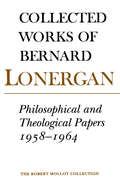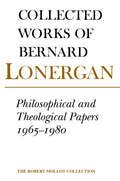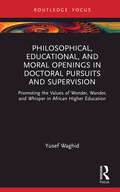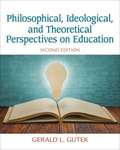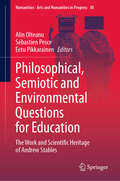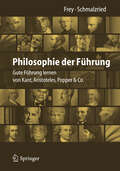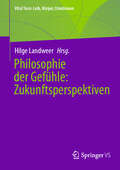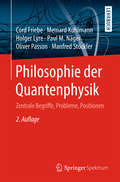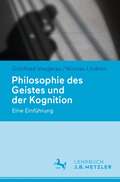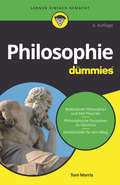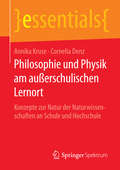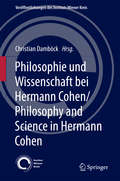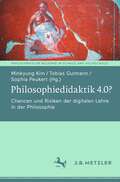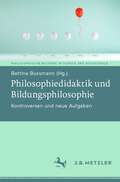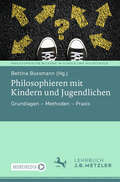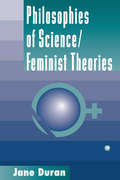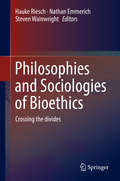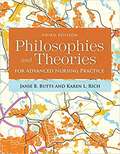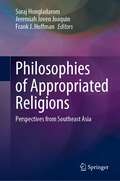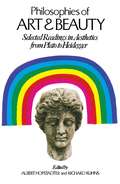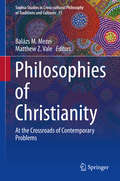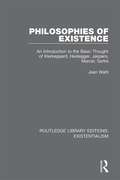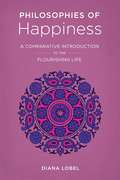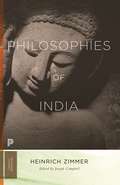- Table View
- List View
Philosophical and Theological Papers, 1958-1964: Volume 6
by Bernard Lonergan Robert Doran, S.J. Frederick Crowe, S.J. Robert CrokenThe period during which Bernard Lonergan delivered the eleven lectures in this volume was one of important transition for him: he was moving rapidly toward a new conception of theology and its method; and he was on the verge of what is now recognized as a major breakthrough in his thought on method, the idea that came to him in February 1965 of the eight functional specialities. While the lectures maintain a continuity with Lonergan's previous work, they also reveal new and significant ideas, especially in regard to his drive toward a new conception of theology as a whole, and his particular concern for the relevance of theology to the spiritual life. The lectures here include 'The Redemption,' 'Method in Catholic Theology,' 'The Philosophy of History,' 'The Origins of Christian Realism,' `Time and Meaning,' 'Consciousness and the Trinity,' `Exegesis and Dogma,' 'The Mediation of Christ in Prayer,' 'The Analogy of Meaning,' 'Philosophical Positions with Regard to Knowing,' and 'Theology as Christian Phenomenon.' This volume provides a key to understanding the development of Lonergan's philosophical and theological thought, his major influences, and the pivotal moments of transition in the road leading up to Method in Theology and beyond.
Philosophical and Theological Papers, 1965-1980: Volume 17
by Bernard Lonergan Robert Doran, S.J. Robert CrokenA companion to Philosophical and Theological Papers 1958-1964 (Volume 6 in the Collected Works of Bernard Lonergan series), this anthology contains Lonergan's lectures on philosophy and theology given during the later period of his life, 1965-1980. These papers document his development in the discipline during the years leading up to the publication of Method in Theology, and beyond to 1980 when he was more engaged in his writings and seminars on macroeconomics. Philosophical and Theological Papers 1965-1980 is divided into five sections, forming units on the basis of dates. The three central sections are each a set of lectures respectively given at the Massachusetts Institute of Technology, Gonzaga University in Spokane, and Trinity College (University of Toronto). Although there is some repetition amongst the lecture sets and in relation to other more familiar works, this repetition displays occasional new turns of phrase that the careful reader will note. In at least one instance, familiar material suddenly opens out onto expressions not to be found anywhere else in Lonergan's work. Other very interesting developments regard the movement from speaking of the immutability of dogmas to their permanence of meaning and the permutations among 'real self-transcendence,' 'performative self-transcendence,' and 'moral self-transcendence.'
Philosophical, Educational, and Moral Openings in Doctoral Pursuits and Supervision: Promoting the Values of Wonder, Wander, and Whisper in African Higher Education (Routledge Research in Higher Education)
by Yusef WaghidThis timely volume conceptualises and applies the philosophical notions of wonder, wander, and whisper, serving as evaluative paradigms for objective assessment of quality doctoral research work and supervision in South African higher education. Written by one of the foremost academics in the field, the book combines the normative philosophical, educational, and moral notions of wonder, wander, and whisper with academic life and studies, focusing on doctoral work and supervision not just as cognitive or scientific processes, but also as existential, ethical, and political shaping of the self. By reflecting on three decades of doctoral supervision, the author gives an account of how his students have been initiated into moral discourses of democratic citizenship education and the intellectual adventures they have embarked upon through scholarly texts. The book also presents itself as a decolonial venture that repositions and resituates doctoral education in resistance to the hegemony of colonisation, inhumanity, inequality, unfreedom, and injustice in Southern Africa. Ultimately arguing for the relevance of wonder, wander, and whisper in academic culture, the book will appeal to scholars, researchers, and postgraduates in the fields of higher education, philosophy of education, and sociology of education as well as African education and doctoral studies more broadly.
Philosophical, Ideological, and Theoretical Perspectives on Education
by Gerald L. GutekGerald Gutek's Philosophical, Ideological, and Theoretical Perspectives on Education uses a systems approach to help readers examine the major schools of philosophy of education; consider the relationship of education to major ideologies including Nationalism, Liberalism, Conservatism, and Marxism; and analyze the impact of philosophy and ideology on educational theory and practice through the theories of Essentialism, Perennialism, Social Reconstruction, and Critical Theory. The concepts are made clear through the book's helpful chapter organization, which includes definitions of terms; historical contributors and antecedents; a general discussion of the particular philosophy, ideology, or theory; and relationship and application to education, especially to schools, curriculum, instruction, and to teachers and students.
Philosophical, Semiotic and Environmental Questions for Education: The Work and Scientific Heritage of Andrew Stables (Numanities - Arts and Humanities in Progress #30)
by Alin Olteanu Eetu Pikkarainen Sébastien PesceThis collected volume celebrates the life and work of the late Andrew Stables, a renowned scholar in semiotics and in educational philosophy and theory. He is known, in particular, for having pioneered the semiotic approach to education. This book celebrates his work with scholarly contributions by leading researchers in these areas of scholarship, reflecting on Andrew Stables&’ thought and intellectual legacy. The contributions are interdisciplinary, which reflects Stables&’ eclectic work. Also included are new and unpublished texts of Andrew Stables. The text is divided into three parts: Philosophy of Education, Learning as Semiotic, and Environmental Literacies. It appeals to students and researchers working in philosophy of education broadly, semiotic-oriented approaches to education, as well as discussions on multimodality.
Philosophie der Führung
by Dieter Frey Lisa Katharin SchmalzriedFührungskräfte arbeiten heute in einem unsicheren Umfeld mit wachsenden Anforderungen und immer variableren Rahmenbedingungen. Dennoch müssen sie Sicherheit ausstrahlen und ihren Mitarbeitern eine Orientierung bieten. Viele Führungskräfte empfinden dies als belastend und suchen nach einer Art Kompass, an dem sie ihr Handeln ausrichten können, nach dauerhaften Prinzipien für eine "gute Führung". Dieses Buch bietet einen solchen Kompass und leitet dazu "neue" Erkenntnisse aus uralten Theorien ab: Hätten Sie gedacht, dass die großen Philosophen von Kant über Rousseau bis Popper Anregungen für Ihr tägliches Führungshandeln bereit halten? - Wie Sie nach Ansicht Aristoteles als Chef ein gutes Vorbild werden? Wie Sie laut Hobbes mit egoistischen Mitarbeitern umgehen können? Wie nach Popper ein kritischer Dialog zu besseren Entscheidungen führen kann? Den Autoren dieses Buches gelingt es, in übersichtlichen Kapiteln verständlich und knapp die Grundlagen einer Theorie zu erklären, praktische Hinweise für eine moderne Führungskraft abzuleiten und schließlich ein verständliches Modell einer ethikorientierten Führung zu formulieren. - Kernthese: Gute Führung, die sich moralischen Werten verpflichtet sieht, ist auch eine erfolgreiche Führung! Und ganz nebenbei liest sich das Buch als eine unterhaltsame Einführung in die großen philosophischen Theorien. Für alle, die mit Aufgaben der Menschenführung betraut sind, ob in sozialen und kommerziellen Organisationen, im Bildungsbereich oder der Kindererziehung.
Philosophie der Gefühle: Zukunftsperspektiven (Vital Turn: Leib, Körper, Emotionen)
by Hilge LandweerDieser Band wirft die Frage nach der gesellschaftlichen Relevanz der inzwischen sehr differenzierten Debatte um die Philosophie der Gefühle auf und bietet ihr so eine neue Orientierung an. In einer 2022 organisierten Diskussion zwischen einigen international renommierten Emotionsforscher*innen mit Nachwuchswissenschaftler*innen, die im Bereich der Philosophie der Gefühle arbeiten, kristallisierten sich vier Bereiche heraus, die besonders aufschlussreich sind: 1. die Rolle von emotionstheoretische Weichenstellungen in der Philosophiegeschichte für aktuelle Orientierungen; 2. phänomenologische Beschreibungen einzelner Gefühle, die in der aktuellen Debatte noch wenig thematisiert werden, aber in deutlichem Zusammenhang mit normativen Fragen oder aktuellen Konfliktlagen stehen; 3. folgenreiche theoretische Kontroversen und Felder, die in der heutigen Philosophie der Gefühle noch zu entdecken sind; 4. die Ontologie des Sozialen und die Affekte.
Philosophie der Quantenphysik: Einführung Und Diskussion Der Zentralen Begriffe Und Problemstellungen Der Quantentheorie Für Physiker Und Philosophen
by Paul M. Näger Cord Friebe Meinard Kuhlmann Holger Lyre Oliver Passon Manfred StöcklerDieses Buch liefert dem Leser eine aktuelle und fundierte Einführung in die Philosophie der Quantenphysik. Obwohl sich die Quantentheorie durch spektakuläre empirische Erfolge auszeichnet, wird bis heute kontrovers diskutiert, wie sie zu verstehen ist. In diesem Werk geben die Autoren einen Überblick über die zahlreichen philosophischen Herausforderungen: Verletzen Quantenobjekte das Prinzip der Kausalität? Sind gleichartige Teilchen ununterscheidbar und daher keine Individuen? Behalten Quantenobjekte in der zeitlichen Entwicklung ihre Identität? Wie verhält sich ein zusammengesetztes Quantensystem zu seinen Teilen? Diese Fragen werden im Rahmen verschiedener Deutungsansätze der Quantentheorie diskutiert. Ein Ausblick in die Quantenfeldtheorie verschärft das Hauptproblem der Nichtlokalität.Philosophie der Quantenphysik richtet sich an Philosophiestudierende mit Interesse für Physik, macht Physikerinnen und Physiker mit den philosophischen Fragen ihres Faches vertraut und liefert Lehramtsstudierenden und Lehrern Anregungen für den gymnasialen Physik-Unterricht. Das Buch schließt damit eine Lücke zwischen populären Einführungen und spezialisierten Monografien zur Philosophie der Quantenphysik im deutschsprachigen Lehrbuchmarkt. In der vorliegenden zweiten Auflage wurde das Kapitel zu Verschränkung und Nicht-Lokalität deutlich erweitert und jedes Kapitel mit Übungsaufgaben und Musterlösungen ergänzt.
Philosophie des Geistes und der Kognition: Eine Einführung
by Gottfried Vosgerau Nicolas LindnerWas ist der Geist und wie funktioniert er? Die Philosophie des Geistes hat sich im Laufe der zweiten Hälfte des 20. Jahrhunderts – neben der Erkenntnistheorie und der Metaphysik – zu einer der zentralen Subdisziplinen der Theoretischen Philosophie herausgebildet. Das Lehrbuch behandelt nicht nur die klassischen Themen der Philosophie des Geistes, sondern stellt auch die neuesten Entwicklungen in Grundzügen vor. Dazu gehören Diskussionen zum Verhältnis des Geistes zum Körper und zur Umwelt, das Verständnis Anderer, Emotionen sowie das Verhältnis von Denken und Sprache. In erster Linie richtet sich das Lehrbuch an Personen, die mit dem Philosophiestudium angefangen haben oder sich einfach einen Überblick über philosophische Fragen und Diskussionen rund um den Geist und unsere geistigen Fähigkeiten verschaffen wollen. – Mit Definitionen, Beispielen und Literaturhinweisen sowie übersichtlichen Zusammenfassungen zur Selbst-Überprüfung.
Philosophie für Dummies (Für Dummies)
by Tom MorrisFanden Sie Philosophie eigentlich schon immer interessant, aber haben sich nie so recht herangetraut? Dann ist dies das Buch für Sie! »Philosophie für Dummies« ist eine Einführung in die Gedanken großer Denker und die verschiedenen Disziplinen, aber vor allem auch eine Ermunterung, sich selbst Gedanken zu machen - über den Sinn des Lebens, ethische Vorstellungen, oder die Frage, was wir überhaupt wissen können ...
Philosophie und Physik am außerschulischen Lernort: Konzepte zur Natur der Naturwissenschaften an Schule und Hochschule (essentials)
by Annika Kruse Cornelia DenzDieses essential zeigt am Beispiel des innovativen Projekts ,,Selberdenken!" auf, wie eine Verbindung von Naturwissenschaft und Philosophie auf der Basis von forschend-entdeckendem Lernen und explorativem Experimentieren an Schule und Hochschule gelingt. Fragen wie ,,Was denkt man, wenn man nach den Bausteinen der Materie sucht?" und ,,Wie schafft man es, Daten durch die Luft zu transportieren?" bieten dabei das Potenzial, Jugendliche für ein tiefgreifendes Verständnis unserer technisierten Welt zu begeistern. Motor für diese kritisch-neugierige Perspektive ist die Naturphilosophie, die auf lebendige Weise neben der fachlichen Dimension auch die Hintergründe von Naturwissenschaft thematisiert.
Philosophie und Wissenschaft bei Hermann Cohen/Philosophy and Science in Hermann Cohen (Veröffentlichungen des Instituts Wiener Kreis #28)
by Christian DamböckDer Band versammelt einen Großteil der Beiträge, die internationale Experten anlässlich der Tagung „Philosophie und Wissenschaft bei Hermann Cohen“ im November 2014 am Institut Wiener Kreis der Universität Wien präsentiert haben. Mit der Tagung zu Hermann Cohen (1842 – 1918), der zusammen mit Paul Natorp die Marburger Schule begründete, wurden zwei Ziele verfolgt: erstens die Aspekte in der Philosophie des Kantianers Cohen herauszuarbeiten, die an die Idee einer Einheitswissenschaft anknüpfen und zweitens Divergenzen und Übereinstimmungen Cohens mit der wissenschaftlichen Weltauffassung, der Programmatik des Wiener Kreises um Rudolf Carnap und Moritz Schlick zu identifizieren. Der Tagungsband ist in drei Teile gegliedert. Die Aufsätze im ersten Teil beschäftigen sich mit der Bedeutung von Erfahrung und Empirismus für das Philosophieverständnis Hermann Cohens. Im zweiten Teil gehen die Autoren der Frage nach, welche Rolle Theorien aus den Bereichen Mathematik, Naturwissenschaften und Psychologie für Cohens Denken gespielt haben – unter anderem Hermann von Helmholtz‘ Theorie des Messens und die Bedeutung der Infinitesimalrechnung für die Philosophie der Marburger Schule. Die Beiträge im dritten Teil des Bandes stellen die Philosophie Cohens und der Marburger Schule den Vertretern des Wiener Kreises und der Berliner Gruppe um Hans Reichenbach gegenüber. Dabei wird Reichenbachs Rezeption der Relativitätstheorie in den Kontext einer Relativierung Kants bei Cohen und Ernst Cassirer gestellt und „versteckte Verwandtschaften“ zwischen Cohen und dem Logischen Empirismus aufgedeckt. Der Band richtet sich an Wissenschaftler auf dem Gebiet der Geschichte der Philosophie.
Philosophiedidaktik 4.0?: Chancen und Risiken der digitalen Lehre in der Philosophie (Philosophische Bildung in Schule und Hochschule)
by Minkyung Kim Tobias Gutmann Sophia PeukertPhilosophie lebt vom unmittelbaren Dialog – das ist zumindest die sokratische Auffassung. Welche Folgen hat es, wenn der unmittelbare Dialog ersetzt wird durch indirektere Arten der Kommunikation? Mit dem zunehmenden Einsatz digitaler Lehrformate an den Universitäten stellt sich diese Frage in besonderer Dringlichkeit. Die Beiträge in diesem Sammelband diskutieren die Chancen und Risiken der digitalen Lehre in der Philosophie. Sie widmen sich u.a. folgenden Fragen: Welche Elemente der Präsenzlehre können durch die digitale Lehre nicht adäquat ersetzt werden? Kann man die Präsenzlehre gewinnbringend mit digitalen Lehrformen kombinieren? Hat die digitale Lehre Auswirkungen auf das Philosophieverständnis der Studierenden? Führt der Einsatz digitaler Lehrformen zu Gerechtigkeitsproblemen?
Philosophiedidaktik und Bildungsphilosophie: Kontroversen und neue Aufgaben (Philosophische Bildung in Schule und Hochschule)
by Bettina BussmannDie Philosophiedidaktik ist eine herausfordernde Disziplin. In ihrer Aufgabe als Vermittlungs- und Reflexionswissenschaft muss sie Entwicklungen der aktuellen Philosophie berücksichtigen, auf die komplexen Veränderungen unserer Lebenswelt reagieren, die Herausforderungen des Lernorts Schule ernst nehmen und die Erkenntnisse wesentlicher Bezugsdisziplinen einbeziehen. Diese Vernetzungsaufgabe verlangt nach systematischen philosophiedidaktischen Untersuchungen für die Lehrkräfteausbildung. Ziel dieses Bandes ist die Analyse und Diskussion der philosophischen, fachdidaktischen und bildungstheoretischen Fragestellungen einer Reihe komplexer Herausforderungen, die für die Ausbildung an der Hochschule, im Referendariat sowie in der Fort- und Weiterbildung wirksam werden: Welche Rolle kann und soll philosophische Bildung in inter- und transdisziplinären Bezügen spielen, wie z.B. bei der Bildung für nachhaltige Entwicklung oder in einem Bildungslabor? Wie kann und sollte Philosophieren mit Kindern praktiziert werden? Wie kann und sollte mit der Forderung nach Inklusion umgegangen werden? Ist problemorientierter Unterricht der Goldstandard philosophischen Unterrichtens oder nicht? Auf diese und weitere Fragen geben die Beiträge der Autor*innen Antworten und Lösungsvorschläge, in denen alte und neue Kontroversen sichtbar werden. Der Band versteht sich als Beitrag zu lebendigen Grundsatzdiskursen, die ein Fundament liefern für die Entwicklung eines zeitgemäßen Philosophie- und Ethikunterrichts.
Philosophieren mit Kindern und Jugendlichen: Grundlagen – Methoden – Praxis (Philosophische Bildung in Schule und Hochschule)
by Bettina BussmannKinder und Jugendliche sind Meister im Staunen. Sie sind neugierig, machen sich Gedanken und stellen unermüdlich Fragen. Dieser Wunsch, Neues zu entdecken und die Fähigkeit, zu staunen, können Ausgangspunkte für philosophische Fragestellungen sein. Wenn Kinder philosophieren, können sie ihre Meinung begründet äußern, das Für und Wider bestimmter Probleme abwägen, Gedankenexperimente durchführen und so über sich selbst hinauswachsen. Kinder brauchen allerdings spezielle Zugänge zur Welt der Philosophie, um das Philosophieren zu lernen, und Gesprächsleiter*innen benötigen dafür entsprechendes philosophisches Wissen, methodische Werkzeuge und ansprechende Materialien. „Philosophieren mit Kindern und Jugendlichen“ ist ein sowohl praxisorientiertes als auch fachphilosophisch fundiertes Lehrbuch. Die Unterrichtsmodule sind für Kinder der Grundschule und der Sekundarstufe 1 konzipiert, vieles eignet sich auch für die Arbeit mit älteren Schüler*innen und Erwachsenen. Alle Einheiten sollen angehenden und praktizierenden Lehrkräften anhand der eingesetzten Materialien vermitteln, was das spezifisch Philosophische der jeweiligen Thematik ist, welche Methoden besonders geeignet sind, welche Probleme auftreten können und worauf man bei der Planung achten muss.
Philosophies Of Science: Feminist Theories
by Jane DuranThis book presents the current feminist critique of science and the philosophy of science in such a way that students of the philosophy of science, philosophers, feminist theorists, and scientists will find the material accessible and intellectually rigorous. }This book presents the current feminist critique of science and the philosophy of science in such a way that students of philosophy of science, philosophers, feminist theorists, and scientists will find the material accessible and intellectually rigorous.Contemporary feminist debate, as well as the debate brought on by the radical critics of science, assumesincorrectlythat certain movements in philosophy of science and science-driven theory are understood in their dynamics as well as in their details. All too often, labels such as Kuhnian or positivistic are taken for granted, and much of the contemporary postmodern or post-structuralist feminist theory that sets out to criticize science does little to alleviate the readers lack of knowledge with regard to such movements. Unlike other texts, Philosophies of Science: Feminist Theories provides a student-oriented framework so that, for example, positivism is given a thorough grounding before the feminist critique of such epistemological theory is given. Other movements discussed include the Kuhnian turn, sociology of science, and the radical critique of science. Feminist theory and critique are interwoven throughout, with one chapter devoted to feminist thought, which includes the work of such thinkers as Longino, Hararway, Hubbard, Nelson, Harding, and Keller. }
Philosophies and Sociologies of Bioethics: Crossing the divides
by Nathan Emmerich Hauke Riesch Steven WainwrightThis book is an interdisciplinary contribution to bioethics, bringing together philosophers, sociologists and Science and Technology Studies researchers as a way of bridging the disciplinary divides that have opened up in the study of bioethics. Each discipline approaches the topic through its own lens providing either normative statements or empirical studies, and the distance between the disciplines is heightened not only by differences in approach, but also disagreements over the values, interpretations and problematics within bioethical research. In order to converse across these divides, this volume includes contributions from several disciplines. The volume examines the sociological issues faced by interdisciplinary research in bioethics, the role of expertise, moral generalisations, distributed agency, and the importance of examining what is not being talked about. Other contributions try to take an interdisciplinary look at a range of specific situations, fetal alcohol syndrome in the media, citizen science, electronic cigarettes and bioethical issues in human geography.
Philosophies and Theories for Advanced Nursing Practice
by Janie B. Butts Karen L. RichPhilosophies and Theories for Advanced Nursing Practice, Third Edition is an essential resource for advanced practice nursing students in master's and doctoral programs. This text is appropriate for students needing an introductory understanding of philosophy and how a theory is constructed as well as students and nurses who understand theory at an advanced level. The Third Edition features expanded discussion of the AACN DNP essentials which is critical for DNP students as well as PhD students who need a better understanding of the DNP educated nurse's role. <p><p> Philosophies and Theories for Advanced Nursing Practice, Third Edition covers a wide variety of theories in addition to nursing theories. Coverage of non nursing related theory is beneficial to nurses because of the growing national emphasis on collaborative, interdisciplinary patient care.
Philosophies of Appropriated Religions: Perspectives from Southeast Asia
by Soraj Hongladarom Jeremiah Joven Joaquin Frank J. HoffmanThis book brings together different intercultural philosophical points of view discussing the philosophical impact of what we call the ‘appropriated’ religions of Southeast Asia. Southeast Asia is home to most of the world religions. Buddhism is predominantly practiced in Thailand, Vietnam, Myanmar, Singapore, Laos, and Cambodia; Islam in Malaysia, Indonesia, and Brunei; and Christianity in the Philippines and Timor-Leste. Historical data show, however, that these world religions are imported cultural products, and have been reimagined, assimilated, and appropriated by the culture that embraced them. In this collection, we see that these ‘appropriated’ religions imply a culturally nuanced worldview, which, in turn, impacts how the traditional problems in the philosophy of religion are framed and answered—in particular, questions about the existence and nature of the divine, the problem of evil, and the nature of life after death. Themes explored include: religious belief and digital transition, Theravāda Buddhist philosophy, religious diversity, Buddhism and omniscience, indigenous belief systems, divine apology and unmerited human suffering, dialetheism and the problem of evil, Buddhist philosophy and Spinoza’s views on death and immortality, belief and everyday realities in the Philippines, comparative religious philosophy, gendering the Hindu concept of dharma, Christian devotion and salvation during the Spanish colonial period in the Philippines through the writings of Jose Rizal, indigenous Islamic practices in the Philippines, practiced traditions in contemporary Filipino celebrations of Christmas, role of place-aspects in the appropriation of religions in Southeast Asia, and fate and divine omniscience. This book is of interest to scholars and researchers of philosophy of religion, sociology of religion, anthropology of religion, cultural studies, comparative religion, religious studies, and Asian studies.
Philosophies of Art & Beauty: Selected Readings in Aesthetics from Plato to Heidegger
by Albert Hofstadter and Richard KuhnsThis anthology is remarkable not only for the selections themselves, among which the Schelling and the Heidegger essays were translated especially for this volume, but also for the editors' general introduction and the introductory essays for each selection, which make this volume an invaluable aid to the study of the powerful, recurrent ideas concerning art, beauty, critical method, and the nature of representation. Because this collection makes clear the ways in which the philosophy of art relates to and is part of general philosophical positions, it will be an essential sourcebook to students of philosophy, art history, and literary criticism.
Philosophies of Art and Beauty: Selected Readings in Aesthetics from Plato to Heidegger
by Albert Hofstadter Richard KuhnsThis anthology is remarkable not only for the selections themselves, among which the Schelling and the Heidegger essays were translated especially for this volume, but also for the editors' general introduction and the introductory essays for each selection, which make this volume an invaluable aid to the study of the powerful, recurrent ideas concerning art, beauty, critical method, and the nature of representation. Because this collection makes clear the ways in which the philosophy of art relates to and is part of general philosophical positions, it will be an essential sourcebook to students of philosophy, art history, and literary criticism.
Philosophies of Christianity: At the Crossroads of Contemporary Problems (Sophia Studies in Cross-cultural Philosophy of Traditions and Cultures #31)
by Balázs M. Mezei Matthew Z. ValeThis book examines key issues in Christianity from various philosophical points of view. It brings together European authors with American theologians and philosophers on an interconfessional basis. Coverage combines analytical and continental approaches in a unique way. This comprehensive, innovative analysis will help readers gain a deep understanding into a wide range of philosophical approaches to basic Christian problems. The novelty of this volume is the unique combination of philosophical and theological approaches. It merges these points-of-view in a rational manner which characterizes segments of Anglo-American and Continental thought. The scope of the work covers historical issues, contemporary problems of atheism, and also novel approaches to fundamental notions. Readers will learn about questions surrounding the French New Theology, Zizek’s philosophical sources, the notion of revelation, and much more. As a work produced by European and United States scholars, this volume is an important contribution not only to the dialogue between various academic cultures, but also to the expression of their fruitful cooperation which grounds and inspires serious academic research. The readership of this work begins at an undergraduate level and reaches up to academic researchers and professors interested in borderline problems between philosophy and theology, history and contemporary issues.
Philosophies of Existence: An Introduction to the Basic Thought of Kierkegaard, Heidegger, Jaspers, Marcel, Sartre (Routledge Library Editions: Existentialism #6)
by Jean WahlThis book, first published in 1969, examines the ‘philosophies of existence’ or Existentialism and the field’s leading philosophers. These philosophers, the book argues, wished to distinguish themselves from other philosophies in their structure and approach – and it is that structure that this book takes care to analyse.
Philosophies of Happiness: A Comparative Introduction to the Flourishing Life
by Diana LobelWhat does it mean to be truly happy? In Philosophies of Happiness, Diana Lobel provides a rich spectrum of arguments for a theory of happiness as flourishing or well-being, offering a global, cross-cultural, and interdisciplinary perspective on how to create a vital, fulfilling, and significant life. Drawing upon perspectives from a broad range of philosophical traditions—Eastern and Western, ancient and contemporary—the book suggests that just as physical health is the well-being of the body, happiness is the healthy and flourishing condition of the whole human being, and we experience the most complete happiness when we realize our potential through creative engagement.Lobel shows that while thick descriptions of happiness differ widely in texture and detail, certain themes resonate across texts from different traditions and historical contexts, suggesting core features of a happy life: attentive awareness; effortless action; relationship and connection to a larger, interconnected community; love or devotion; and creative engagement. Each feature adds meaning, significance, and value, so that we can craft lives of worth and purpose. These themes emerge from careful study of philosophical and religious texts and traditions: the Greek philosophers Aristotle and Epicurus; the Chinese traditions of Confucius, Laozi, and Zhuangzi; the Hindu Bhagavad Gītā; the Japanese Buddhist tradition of Soto Zen master Dōgen and his modern expositor Shunryu Suzuki; the Western religious traditions of Augustine and Maimonides; the Persian Sufi tale Conference of the Birds; and contemporary research on mindfulness and creativity. Written in a clear, accessible style, Philosophies of Happiness invites readers of all backgrounds to explore and engage with religious and philosophical conceptions of what makes life meaningful.Visit https://cup.columbia.edu/extras/supplement/philosophies-of-happiness for additional appendixes and supplemental notes.
Philosophies of India (Princeton Classics #71)
by Heinrich Robert ZimmerA Princeton Classics edition of an essential work of twentieth-century scholarship on India Since its first publication, Philosophies of India has been considered a monumental exploration of the foundations of Indian philosophy. Based on the copious notes of Indologist, linguist, and art historian Heinrich Zimmer, and edited by Joseph Campbell, this book is organized into three sections. “The Highest Good” looks at Eastern and Western thought and their convergence; “The Philosophies of Time” discusses the philosophies of success, pleasure, and duty; and “The Philosophies of Eternity” presents the fundamental concepts of Buddhism, Brahmanism, Jainism, Sankhya and yoga, and Tantra. This work examines such areas as the Buddhist Tantras, Buddhist Genesis, the Tantric presentation of divinity, the preparation of disciples and the meaning of initiation, and the symbolism of the mandala-palace Tantric ritual and twilight language. It also delves into the Tantric teachings of the inner Zodiac and the fivefold ritual symbolism of passion. Appendices, a bibliography, and general and Sanskrit indexes are included.
